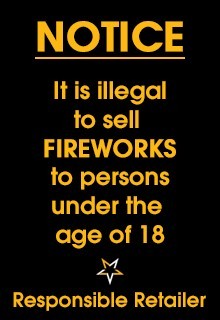Categories
- Buy 2, Get 1 FREE Deals
- Fireworks Display Packages
- Single Ignition Display Units
- Compound Cake Display Units
- Selection Boxes
- Rocket Packs
- Barrage Packs
- Roman Candle Cakes
- Roman Candles & Shot Tubes
- Fountains and Mines
- Catherine Wheels
- Sparklers
- Firecrackers
- Fireworks Accessories
- Gender Reveal
- Indoor Fireworks
- Glow Products
- Confetti Party Cannons
- Chinese Sky Lanterns
- Smoke Fountains & Flares
- Remote Firing Systems
- Discontinued Products
- Last Minute Central London Collections
Consumer's Guide to Using Fireworks
Basic Storage Advice:
Fireworks contain explosives! Please ensure you get into your mindset that you are handling and storing explosives and not toys.
When storing fireworks at home the main things to ensure are:
- The fireworks are kept away from any sources of heat or ignition, including heaters, naked flames and people smoking. Never smoke while handling fireworks!
- The fireworks are kept dry. It is essential that your fireworks are kept dry. Beware of storing fireworks outside in sheds which can get damp and avoid anywhere with significant changes of temperatures including greenhouses, conservatories and lofts which could result in condensation. If you must keep your fireworks in the shed, wrap them up tightly in well sealed bin liners or plastic bags.
- Store fireworks in their original packaging (mail order fireworks will be supplied in tough cardboard cartons)
- Do not store fireworks with any other flammable materials including petrol, oil or paint
- If there is a possibility of children or animals having access to the fireworks, keep them stored in a lockable container or cabinet
- Make use of your fireworks supplier! Many retailers are happy to store your fireworks for you until closer to your display. This is by far the safest option
- Sparklers are also fireworks and should be stored as explained above
Legal Storage Requirements:
Your consumer fireworks will be classed for transport as either 1.4S (0337) for indoor fireworks, 1.4G (0336) or 1.3G (0335) by the UN for outdoor fireworks. Fireworks supplied in their own individual boxes (referred to as “cartons” in the trade) will have an orange hazard diamond on the side to indicate their classification. For loose items, consult your retailer.
The storage laws are governed by MSER (Manufacture and Storage of Explosives Regulations 2005) which determine the legal limits for Hazard Type 3 (HT3) and Hazard Type 4 (HT4) fireworks. Generally speaking it is safe to assume that 1.4G fireworks are Hazard Type 4 and 1.3G fireworks are Hazard Type 3. This is the assumption used for the remainder of this article however we advise you consult your fireworks supplier for confirmation of the exact hazard types of the fireworks you are buying.
All storage quantities relate to the Net Explosive Content or NEC of a firework. This is not the same as the firework’s gross weight. For example, a firework may weigh 5kg but the actual NEC may only be 0.5kg. Your supplier should be able to tell you what the NEC of your fireworks is. If not, it can be estimated to be around one quarter of the firework’s total weight as a worst case scenario to work from.
In short, the limits for storing fireworks at home without registration are:
Hazard Type 4 (usually 1.4S and 1.4G):
- Up to 5kg NEC can be stored for an unlimited time
- Up to 50kg NEC can be stored for up to three weeks
- Up to 250kg NEC can be stored for up to three consecutive days and in their place of intended use
Although these weights might not sound very much, remember they refer to the explosive content of the fireworks and not their gross (overall) weight. A huge 10Kg barrage for example might contain less than 1Kg of explosive. Taking this into account, these limits are actually quite liberal for HT4 fireworks.
Hazard Type 3 (usually 1.3G):
- Up to 5kg NEC can be stored for an unlimited time
- Up to 100kg NEC can be stored for up to three consecutive days and in their place of intended use
As you can see the limits for HT3 fireworks are considerably more restrictive.
Note: Where there is a mix of HT4 and HT3 fireworks they are treated as if they were all HT3. In practical terms this means if 99% of your fireworks are labelled as 1.4G and you have a single 1.3G firework then legally all of your fireworks would be viewed for the purposes of storage as 1.3G and therefore the limits for HT3 will apply.
Buying Fireworks:
- Persons under the age of 18 must not purchase fireworks
- Only fireworks complying with The Firework (Safety) (as Amended) Regulations and the 2003 and 2004 Fireworks (as Amended) Regulations may be sold to the public
- All products must comply with British Safety Standards (BS7114: Part 2: 1988)
- The periods where selling fireworks without a retailer requiring a sales licence is:
- Guy Fawkes, from 15th October and ending on 10th November
- New Year, from 26th December and ending on the 31st December
- Chinese New Year, the first day and the three days immediately preceding it
- Diwali, the first day and the three days immediately preceding it
- Retailers wishing to sell fireworks outside these dates must obtain a licence from their local authority. This will be in addition to the storage licence
Fireworks Display:
Below we have listed some safety recommendations when using fireworks, we suggest you follow these steps to ensure you have a safe and enjoyable fireworks display.
Lighting Fireworks
- We recommend only one person should be responsible for lighting and letting off fireworks
- Lighting fireworks under the influence of alcohol is extremely dangerous and should be avoided at all times
- Light fireworks at arm’s length, using a port fire or one of our firework lighters found in the sparklers section
- Spectator distances are provided on each firework and should be followed to ensure the safety of spectators
- Never go back to a firework that has been lit, even if it has not gone off it could still potentially explode
- Never run away once a firework has been lit. Always walk. Generally, fuses are designed to allow for a minimum of 5 seconds before the display begins, giving the firer enough time to get to a suitable safety distance
Sparklers & Children
- Supervise children with sparklers and children under five years of age should not be in possession of any sparklers
- Light sparklers one at a time
- Wear gloves
- Use a bucket of sand or water to dispose of any used or hot sparklers placing the hot end into the bucket first
Accessories
- A closed metal box to store the fireworks and take them out one at a time
- Follow the instructions on each firework and read them using a torchlight, never by a naked flame
- A bucket of water to extinguish sparklers or to assist with any unforeseen events
- Eye protection and gloves
- For those fireworks that need to be buried into the ground, we suggest you use a bucket of sand and bricks
- A suitable post for securing Catherine wheels is ideal
Other Tips
- Keep pets indoors
- Give your neighbours advanced warning that you will be setting off fireworks; it’s always nice to let them know especially if they are elderly
- Never throw fireworks or put them in your pocket
- Never throw spent fireworks on a bonfire
- Take care around bonfires




